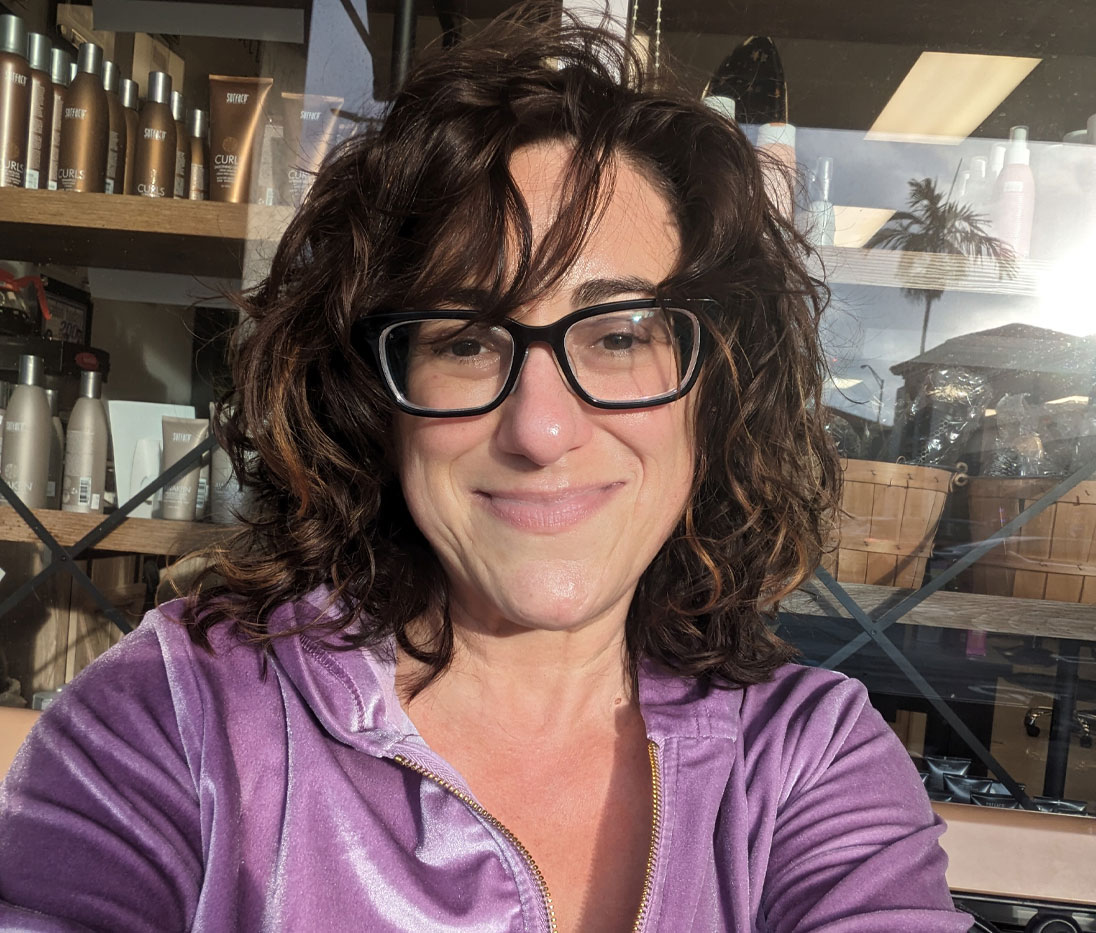I have breast cancer. I’m doing really well, and my prognosis is excellent.
I can’t count how many conversations and emails I’ve started with those words since November 20, 2023, when my OBGYN called to tell me my diagnosis. They remain true, and I have been incredibly fortunate at every step in my journey. I’ve also learned a few things that I think can help anyone who’s been diagnosed or supporting someone diagnosed with cancer.
Make sure you have a correct, confirmed diagnosis.
 Rochelle is a writer and a cancer survivor.
Rochelle is a writer and a cancer survivor.My cancer appeared (and, in fact, was) extremely straightforward and simple. Something “different from last year” was found during a routine screening at my neighborhood mammography center. That led to more imaging and a biopsy, with pathology showing the most common type of breast cancer: invasive ductal carcinoma, estrogen-receptor-positive, progesterone-receptor positive, HER2-negative. The mass appeared really small.
Still, from the moment my OBGYN called me with my diagnosis, I knew I wanted a second opinion – including new pathology – and I knew I wanted it from Sylvester Comprehensive Cancer Center, part of the University of Miami Health System. It’s the National Cancer Institute-designated center in my backyard. I made an appointment with a breast cancer surgeon at the center where my biopsy had happened and with a surgeon at Sylvester.
This next part is incredibly important: Sylvester had my biopsy sample sent over and re-did the pathology to arrive at an independent diagnosis – a crucial part of any second opinion many patients don’t consider.
As it happened, I saw both surgeons the same day. They both made identical diagnoses and recommended the same treatment path.
Don’t assume you know your treatment path.
Within 24 hours of diagnosis, I had already decided that I would have a full mastectomy – the only question in my mind was whether it would be one or both breasts. I figured being young made recovery from this major surgery easier now than in 10 or 20 years if I had a recurrence.
Imagine my shock when both surgeons told me that the standard of care for my type and size of cancer was a partial mastectomy – the medical term for a lumpectomy – followed by radiation, with research showing long-term survival rates at least as good with this much less invasive approach. I actually had difficulty wrapping my brain around this new development. I could have chosen to have a mastectomy or even a bilateral (both breasts) mastectomy. Some women do this for peace of mind, but both surgeons assured me there was no medical reason for it in my case.
Quality research can really help your decision-making.
I’m persuaded by quality research. After both surgeons recommended lumpectomy plus radiation, I went home and started at UM’s physician blog, InventUM, branching out to Komen.org. Komen summarizes academic research on breast cancer in plain language, with links to original publications. I also visited the National Institutes of Health website and read its “Breast Cancer” StatPearls research summaries and links. StatPearls and Komen were in highly accessible language for the layperson and really made that deep dive unnecessary.
In my case, academic studies showed that partial mastectomy, followed by radiation, had long-term outcomes at least as good as mastectomy, and I decided to follow the surgeons’ recommendation.
You will have so many questions. Keep a running list.
I used an app on my phone, browser, computer, and tablet to make a checklist of questions. I just kept adding to it – including questions from family and friends asked me that I couldn’t answer. When I met with each surgeon, I printed a current copy of my checklist and asked the relevant questions. It’s easy to get flustered and forget things, so the checklist is invaluable. Through surgery, radiation, follow-ups and my first post-active-treatment checkup, I used my checklist every appointment.
Your feelings about your cancer likely differ from what other people expect.
My diagnosis came two months after my mom died of ovarian cancer, following two and a half years of treatment. I had spent the last months of her life living at my parents’ home in another state and only returned home a few weeks earlier. As I absorbed the news of my own cancer, I wasn’t scared or sad. I was … annoyed. There’s a lot of ground to cover when getting to cancer surgery. If your surgeon is thorough, there are several pre-surgery medical appointments. Sylvester offers many resources, including dietitians, social workers, emotional counseling and financial counseling. Take advantage of these, as you need the support more than you may realize. But those conversations and meetings also take up time.
I did eventually experience sadness and fear, but during my early journey, I mostly experienced annoyance and gratitude. And once the surgery was finally done, I was mostly just grateful (and tired). I was, and have continued to be, incredibly fortunate that this cancer was discovered so early, so small, on a routine screening. I had easy access to a board-certified surgical oncologist at an NCI-designated cancer center, covered by my insurance, and an early-stage cancer with an easy treatment path. As important, I had all the personal resources I needed: a great husband capable of taking care of me, friends and family willing and able to provide support and assistance, knowledgeable acquaintances and friends who had experienced cancer and were able to give me very helpful direction, ready access to transportation to all appointments, and more.
As I write this, I’m in the early survivorship stage of my cancer. Surgery is done, radiation is done, and my wounds are small scars. I do daily exercises to regain full mobility around my shoulder and chest, plus massage and skin treatments. I’m on five years of tamoxifen to minimize the chances of recurrence, plus regular oncologist check-ups. The next phase of my journey will be to delve into survivorship. I’m excited!